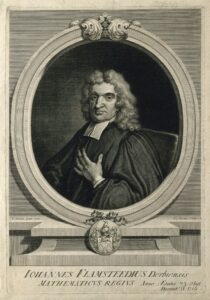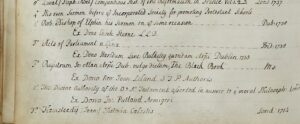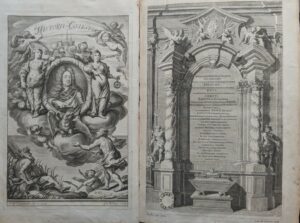
‘Sacrifice to Heavenly Truth’: Tracing John Flamsteed’s History of the Heavens
Maddock Fellow Emma Hill tracks down the surviving copies of a pirated 18th century book

John Flamsteed (1647-1719). Line engraving by G. Vertue, 1721, after T. Gibson, 1712. Wellcome Collection. Public Domain.
I am creating a census of the works of the first Astronomer Royal, John Flamsteed (1646-1719), including his catalogue of the stars Historia Coelestis Libri Duo (1712). This monumental work was far more extensive than any previous star catalogue. It recorded an incredible 3000 fixed stars, the product of over 30 years of observation by the author.
In 1712, Isaac Newton and Edward Halley published 400 copies of Historia Coelestis. This was against the wishes of Flamsteed who considered the work incomplete, and bitter feud ensued. In response to this ‘pirated’ edition, Flamsteed destroyed 300 of the volumes, an action he described as a ‘sacrifice to Heavenly Truth’. I was grateful for the opportunity to visit Marsh’s Library as a Maddock Research Fellow to study their copy of this unlikely survivor.
With the exception of a few indeterminable manuscript marks on the endleaves, Marsh’s copy contains no evidence of ownership. The Library’s donation book, however, revealed that it was donated c.1739-40 by Dublin-born bibliophile John Putland (1709-1773).
At the time of this donation Putland already owned a copy of Historia Coelestis, now at the Royal Collection Trust. That copy contains Putland’s armorial bookplate on which he noted both the price he paid (£5-5-0) and the date he purchased it (1731). Putland often marked the ownership of his books, making it easy to identify surviving books from his library. The lack of such marks on the Marsh’s copy suggest it was not part of his personal collection.

The last line of this page in Marsh’s Donation Books records John Putland’s donation of Historia Coelestis
Where did Putland acquire an extra copy and why did he donate it? I discovered that he likely inherited the book from his stepfather Richard Helsham (c.1682-1738). Helsham died in 1738, shortly before the donation was recorded in c.1739-40. He bequeathed most of his books to his stepson, who incorporated them into his own collection, distinguishing them with a manuscript note of ‘Ex Libris R.H.’. Such marks are missing from Marsh’s copy, again suggesting it was never integrated into Putland’s own library.

Engraved frontispiece and title page of Historia Coelestis
I think Putland inherited this duplicate copy of Historia Coelestis from Helsham and then gifted it to Marsh’s Library. It seems the book passed through Putland’s hands but was not part of his extensive personal collection; his brief period of ownership is remembered instead only in the Library’s donation book.
It was a joy to be able to investigate this copy in person and this case study has made a valuable contribution to my understanding of the circulation of Flamsteed’s work.




